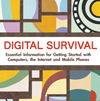Submitted by katie on Wed, 02/02/2011 - 16:27
 If you are concerned about someone monitoring your search keywords, you can use an SSL connection with Google. Just type in https://www.google.com. This doesn't prevent Google from logging your search requests, but it does ensure that your search is not being monitored by a third party on the internet.
If you are concerned about someone monitoring your search keywords, you can use an SSL connection with Google. Just type in https://www.google.com. This doesn't prevent Google from logging your search requests, but it does ensure that your search is not being monitored by a third party on the internet.
Submitted by katie on Wed, 02/02/2011 - 16:11
- Don't use Internet Explorer. Internet Explorer is the most common web browser, but it has many flaws and vulnerabilities that viruses and spyware take advantage of. Instead, consider Mozilla Firefox which is recognised as being safer and more secure than Internet Explorer. It's free to download and install, and it has a number of add-ons which enhance the security and privacy of your internet browsing.
Submitted by katie on Wed, 02/02/2011 - 16:09
 Many countries have installed software to prevent people from accessing certain websites and internet services. Companies, schools and public libraries often use similar software to prevent employees, students and patrons from accessing material that they consider distracting or harmful.
Many countries have installed software to prevent people from accessing certain websites and internet services. Companies, schools and public libraries often use similar software to prevent employees, students and patrons from accessing material that they consider distracting or harmful.
Submitted by katie on Wed, 02/02/2011 - 15:59
 A web-browser is the main way for you to view information on the internet. If you are reading this guide on the web, then you are using a web-browser to do it. The most commonly used browsers are Internet Explorer, Mozilla Firefox, Apple Safari and Google Chrome. Most of what you do on the internet can be done via the web-browser.
A web-browser is the main way for you to view information on the internet. If you are reading this guide on the web, then you are using a web-browser to do it. The most commonly used browsers are Internet Explorer, Mozilla Firefox, Apple Safari and Google Chrome. Most of what you do on the internet can be done via the web-browser.
This includes: -
Submitted by katie on Wed, 02/02/2011 - 15:44
 All data travels through the internet in a readable format unless it is encrypted. SSL stands for Secure Socket Layer; this is the technology which allows your computer to communicate over the internet privately. SSL turns the information into a code (encrypts it) so that it cannot be read by unauthorised people. You may have seen SSL on banking websites where you are required to enter private financial information.
All data travels through the internet in a readable format unless it is encrypted. SSL stands for Secure Socket Layer; this is the technology which allows your computer to communicate over the internet privately. SSL turns the information into a code (encrypts it) so that it cannot be read by unauthorised people. You may have seen SSL on banking websites where you are required to enter private financial information.
Submitted by katie on Wed, 02/02/2011 - 15:41
If you don't have your own computer the easiest way to access the internet is to visit an internet café which provides computers connected to the internet for customers to use. If you do have your own computer, and you plan to use the internet a lot and don't want to sit for hours a day in an internet café, you can set up your own internet connection. To do this, you will need: - To open an account with an Internet Service Provider (ISP) - Some extra equipment to help your computer make the connection.
Submitted by katie on Wed, 02/02/2011 - 15:32
 Introduction
Introduction
The internet can't be bought or owned by an individual, the way a computer or a software programme can. It is made up of millions of computers connected to each other, all around the world, constantly sharing, swapping and storing information. This section covers simple ways of getting the most out of the internet. It will also introduce you to some of the basic security precautions that you should follow in order to use the internet safely.


 If you are concerned about someone monitoring your search keywords, you can use an SSL connection with Google. Just type in
If you are concerned about someone monitoring your search keywords, you can use an SSL connection with Google. Just type in  A web-browser is the main way for you to view information on the internet. If you are reading this guide on the web, then you are using a web-browser to do it. The most commonly used browsers are Internet Explorer, Mozilla Firefox, Apple Safari and Google Chrome. Most of what you do on the internet can be done via the web-browser.
A web-browser is the main way for you to view information on the internet. If you are reading this guide on the web, then you are using a web-browser to do it. The most commonly used browsers are Internet Explorer, Mozilla Firefox, Apple Safari and Google Chrome. Most of what you do on the internet can be done via the web-browser. Introduction
Introduction